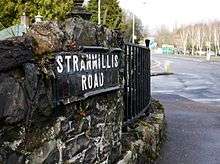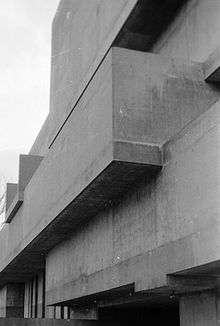Stranmillis

Stranmillis (from Irish an Sruthán Milis, meaning "the sweet stream") is an area in south Belfast, Northern Ireland. It is also an electoral ward for Belfast City Council, part of the Laganbank district electoral area.[1] As part of the Queen's Quarter, it is the location for prominent attractions such as the Ulster Museum and Botanic Gardens.[2][3] The area is located on Stranmillis Road, with Malone Road to the west and the River Lagan to the east.
Stranmillis Road begins at the junction of University Road, Malone Road and College Gardens, heading uphill and southwards past Friar's Bush Graveyard and a small shopping district, before descending towards the River Lagan. The route then swings to the west around the outside of Stranmillis College and uphill again, before rejoining the Malone Road. The north end of Stranmillis Road contains many shops and restaurants, while the south end of the road is mainly housing.

The Malone and Stranmillis Historic Urban Landscape featured on the 2010 tentative list of sites proposed for addition to the List of World Heritage Sites of the United Kingdom, as an area of architectural interest featuring examples of the Arts and Crafts Movement.[4]
History
In the 9th or 10th century A.D. a rath was built on the bank of the Lagan. The site is one of Belfast's best surviving ringforts and now lies in the grounds of Stranmillis College.[5]
In 1603 Sir Arthur Chichester was granted expansive lands in Ulster, including all of the land west of the Lagan from Carrickfergus to Dunmurry, and the site of the future City of Belfast. In 1606 he leased his Stranmillis lands for 61 years to Moses Hill, who built a plantation castle. This was described in the Report of the Plantation Commissioner around 1611 as being located at a place called "Stranmellis".[6] The castle guarded a crossing point of the Lagan, close to today's King's Bridge. The site of the castle has been traced to some Victorian farm buildings in the centre of the current estate, and historian George Benn stated during the 19th century that the ruins of the building existed "almost within living memory".[5] Hill also built a second castle at Malone, on the site of what is now Malone House.[5]
Before the lease expired, the Hill family moved out of Stranmillis and the lands reverted to the Chichester family to become the Countess of Donegall's Deer Park. In 1683 Richard Dobbs described it as "a very fine Park, well stored with Venison and in it a Horse Course of Two Miles". A Donegall document defines it as "Stranmellis Park".[6]
Places of interest
Several well-known Belfast landmarks are located in the area, including:
- Botanic Gardens, a 28-acre (110,000 m2) public park opened in 1828, including some rare species in the 19th-century Palm House and Tropical Ravine.[3][7]
- The Ulster Museum is situated adjacent to the park and has been located in Stranmillis since 1929.[2]
- The Lyric Theatre moved to its current location on the bank of the Lagan in 1968.[8] The theatre was fully redeveloped between 2007 and 2011.[9]
Stranmillis College and Queen's University
Stranmillis University College is located at the midway point of the road. Established as a teaching college in 1922, it is now a constituent college of Queen's University.[10]

Several prominent Queen's University buildings are located on Stranmillis Road, including the David Keir Building and the multi-storey Ashby Building, while the University's Physical Education Centre is located close to the river and adjacent to the Botanic Gardens.[11][12]
Friar's Bush Graveyard
Friar's Bush Graveyard is one of the oldest Christian sites in Belfast, with some graves dating to the early mediaeval period.[13] The site is marked on a map of 1570. In the 18th century when Catholics were forbidden to build a church in Belfast they met at Friar's Bush which was then outside the town boundary, for Holy Communion. Mass ceased in 1769.[14]
River Lagan
The Stranmillis Embankment along the Lagan marks the eastern edge of the Stranmillis area. A towpath runs from here along the river, south to the city of Lisburn and north as far as Jordanstown.[15] On Lockview Road where Stranmillis meets the river, a number of boating organisations including Queen's University Belfast Boat Club have access to the water.[16]
World Heritage Site nomination
In 2010 the Malone and Stranmillis Historic Urban Landscape was added to the tentative list of sites proposed for addition to the List of World Heritage Sites of the United Kingdom as an area of architectural interest featuring examples of the Arts and Crafts Movement.[4] The site was not put forward for the UK shortlist in 2011.[17]
See also
References
- ↑ "Ward Information for Stranmillis Ward 95GG42". NISRA. Retrieved 26 December 2014.
- 1 2 "New date set for museum opening". BBC News Online. Retrieved 26 December 2014.
- 1 2 "Palm House". Friends of Belfast Botanic Gardens. Retrieved 8 April 2013.
- 1 2 UK Tentative List of Potential Sites for World Heritage Nomination: Application form – Malone and Stranmillis Historic Urban landscape, Northern Ireland (PDF), United Kingdom Department for Culture, Media and Sport, retrieved 2 December 2010
- 1 2 "Stranmillis Conservation Area" (PDF). Planning NI. 3 July 1996. Retrieved 26 December 2014.
- ↑ "The Tropical Ravine". Friends of Belfast Botanic Gardens. Retrieved 8 April 2013.
- ↑ Byrne, Ophelia (24 March 2009). "The Lyric Theatre: The only theatre in Belfast to remain open throughout the Troubles". Retrieved 26 December 2014.
- ↑ Bowie-Sell, Daisy (2 May 2011). "The Crucible opens The Lyric theatre Belfast". Belfast Telegraph. Retrieved 26 December 2014.
- ↑ "University Colleges". Queen's University Belfast. Retrieved 26 December 2014.
- ↑ "Other buildings". Queen's University Belfast. Retrieved 26 December 2014.
- ↑ "Queen's Sport Botanic PEC". Queen's University Belfast. Retrieved 26 December 2014.
- ↑ "Origin of Belfast Street Names". Retrieved 26 December 2014.
- ↑ Weatherall, N (2002). South Belfast Terrace and Villa. ISBN 1900935287.
- ↑ "Lagan and Lough Cycle Way". Cycle NI. Retrieved 26 December 2014.
- ↑ "Queen's Sport – Boat House". Retrieved 26 December 2014.
- ↑ "Eleven potential World Heritage Sites make up UK shortlist". Department for Culture, Media and Sport. 22 March 2011. Retrieved 26 December 2014.
External links
| Wikimedia Commons has media related to Stranmillis Road, Belfast. |
